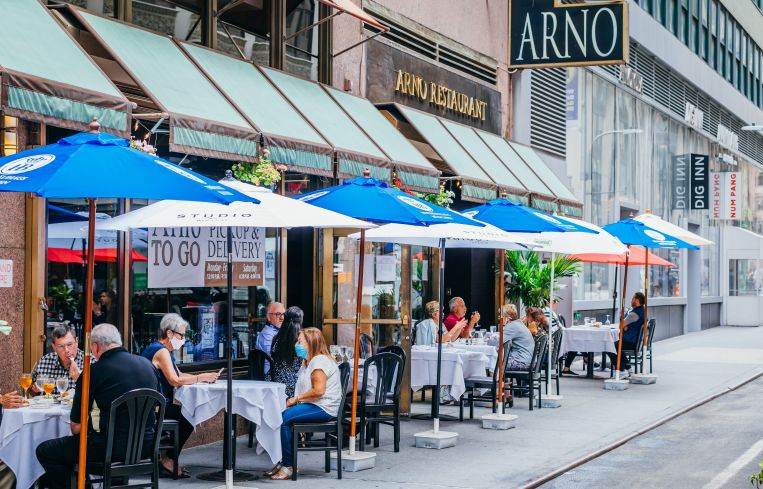City Planning Commission Votes to Make NYC Outdoor Dining Permanent
Some restaurateurs won’t even consider looking at a property that doesn’t have room for sidewalk seating space
By Celia Young November 16, 2021 1:39 pm
reprints
The City Planning Commission cleared the way for outdoor dining structures to become a permanent fixture of city life on Monday in a potential boon for retail landlords, even as some locals complained about them, moving the matter to the New York City Council and then to Mayor Bill de Blasio.
Outdoor dining — which started after the pandemic forced capacity restrictions on local restaurants — has become so crucial to eateries that some won’t even consider looking at a property that doesn’t have room for sidewalk seating space, Adelaide Polsinelli, an investment sales broker and a vice chair at Compass who markets retail properties to buyers, told Commercial Observer.
“The first thing they’re asking is: Is there an outdoor seating area available?” Polsinelli told Commercial Observer. “If it doesn’t have an outdoor space then they’re not booking [tours].”
Outdoor space, referred to as “sidewalk cafes” in the amendment, has been a boon to restaurants and retail landlords, who have seen rents tick up thanks to the city’s Open Restaurants Program, Polsinelli said. The amendment would remove geographic restrictions on sidewalk cafes, allowing more to crop up.
But the zoning text amendment wouldn’t be implemented until the New York City Department of City Planning and the New York City Department of Transportation (DOT) establish a permanent outdoor dining program. The two organizations are seeking input from the public on how to make de Blasio’s Open Restaurants Program permanent, according to the city.
“The necessity of moving dining outdoors during an emergency gave New York City the rare opportunity to pilot a significant land-use change on a citywide scale, and in doing this to recognize the incredible vibrancy outdoor dining can bring, not just to Manhattan, but to all five boroughs if we enable it,” Anita Laremont, chair of the City Planning Commission chair, said during the commission’s vote on Monday, according to CityLand.
Even as the coronavirus pandemic shuttered New York’s nightlife, almost 12,000 restaurants created outdoor dining spaces, CityLand reported. And the city estimated that the program saved 100,000 jobs even as the pandemic decimated the restaurant and hospitality industry, forcing closures en masse, The New York Times reported.
Restaurateurs who don’t plan on using outdoor dining space want to have it as a safety net in case another wave of the pandemic puts the hospitality industry in desperate need of a way to draw in business. And, as a result, restaurant retail rents are increasing, Polsinelli said.
“Even if they don’t use it, they want to know they have it or they can use it at some point in the future,” the broker said. “It’s all about options. It’s about control and options.”
Proponents of the program are hoping the city will expand it, which could mean legislative changes including DOT oversight, establishing rules, an application process and fees. Those fees might make it less profitable for restaurants who have to deal with managing a larger space, crowds and trash, Polsinelli said.
Polsinelli said she’s experienced louder noise levels in her neighborhood, Greenwich Village, where tensions have grown as other residents protest outdoor dining, which they say has made the neighborhood unbearably loud into the late-night hours.
“If you walk down MacDougal Street it is wall-to-wall restaurants and people in the street,” Polsinelli said. “The congestion is a serious issue for the residents on that block … There’s got to be some kind of neighborly code where you’re not disrupting but you’re allowed to do your business.”
Some have even taken to the courts — 22 New Yorkers are suing the city to prevent the program from becoming permanent, the Brooklyn Eagle reported. But the oncoming winter weather may chill this heated debate, as temperatures drop and New Yorkers head indoors.
Celia Young can be reached at cyoung@commercialobserver.com.



